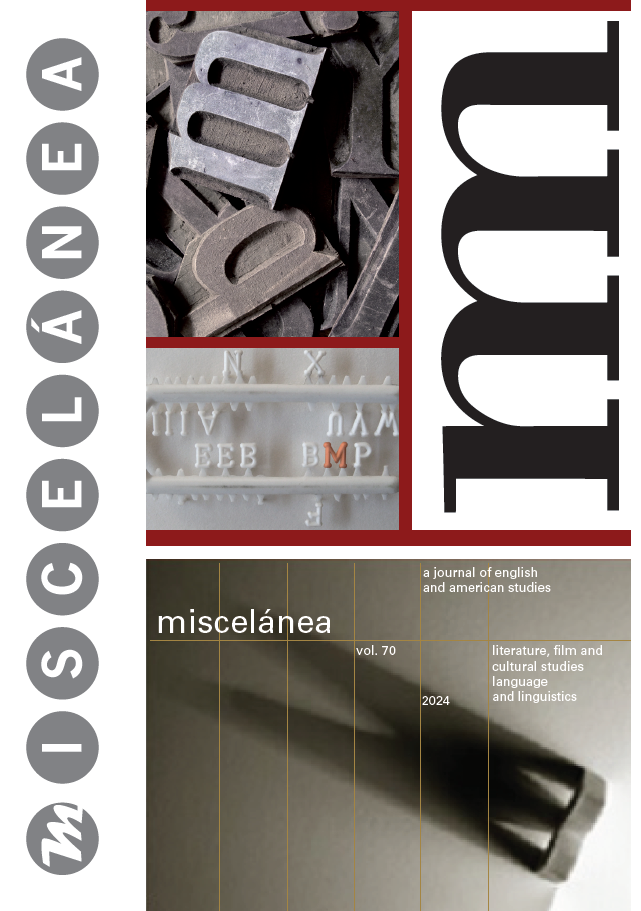Una educación para (futuras/os) profesionales de la salud y expertas/os en literatura: The Cancer Journals de Audre Lorde y Cancer Vixen de Marisa Marchetto
DOI:
https://doi.org/10.26754/ojs_misc/mj.202410198Palabras clave:
cáncer de mama, diarios, medicina gráfica, paciente, profesionales sanitariosResumen
Los testimonios de mujeres sobre el cáncer de mama reclaman su derecho a la salud, pero como este ensayo demuestra, Cancer Journals (1980) de Audre Lorde y Cancer Vixen (2006) de Marisa Marchetto igualmente enseñan lecciones a (futuras/os) profesionales de la salud y a expertas/os en literatura para, respectivamente, mejorar sus relaciones con las pacientes de cáncer y apreciar el poder terapéutico de las autopatografías: la recuperación emocional de sus autoras y lectoras. Lorde emplea el arma de la rabia para criticar que la profesión médica es insensible y deshumaniza a la enferma de cáncer, además de afirmar, con orgullo, su nueva identidad tras la mastectomía: guerrera con un solo pecho. En cambio, Marchetto elige el humor para describir su batalla de once meses contra el cáncer de mama y sus complicaciones: no tener seguro médico para tratar su enfermedad y su miedo a perder a su prometido. No obstante, como este artículo examina, Cancer Vixen refleja que la medicina gráfica, como nuevo género narrativo, mitiga el antagonismo entre médicos y pacientes, a la vez que ayuda a que profesionales sanitarios y expertas/os en literatura empaticen con las historias personales de las enfermas de cáncer de mama más allá de encuentros clínicos y hospitalarios.
Descargas
Referencias
ALEXANDER, Elizabeth. 1994. “‘Coming out Blackened and Whole’: Fragmentation and Reintegration in Audre Lorde’s Zami and The Cancer Journals”. American Literary History 6 (4): 695-715. DOI: https://doi.org/10.1093/alh/6.4.695
BOYER, Anne. 2019. The Undying: A Meditation on Modern Illness. London: Allen Lane.
BURKE, Jonathan. (ed.) 2013. The Topic of Cancer: New Perspectives on the Emotional Experience of Cancer. London: Karnac.
CHUTE, Hillary. 2007. “Our Cancer Year/Janet and Me: An Illustrated Story of Love and Loss, and: Cancer Vixen: A True Story, and: Mom’s Cancer, and: Blue Pills: A Positive Love Story, and: Epileptic, and: Black Hole (review)”. Literature and Medicine 26 (2): 413-429. <https://doi.org/10.1353/lm.0.0005>. DOI: https://doi.org/10.1353/lm.0.0005
COUSER, G. Thomas. 1997. Recovering Bodies: Illness, Disability, and Life Writing. Madison: Wisconsin U.P.
CZERWIEC, M.K., Ian WILLIAMS, Susan Merrill SQUIER, Michael J. GREEN, Kimberly R. MYERS and Scott T. SMITH. 2015. Graphic Medicine Manifesto. University Park: Pennsylvania State U.P.
FRANK, Arthur. 1995. The Wounded Storyteller: Body, Illness and Ethics. Chicago: University of Chicago Press. DOI: https://doi.org/10.7208/chicago/9780226260037.001.0001
FREDIANI, Federica. 2017. “Unsound Elegy: Breast Cancer in The Dying Animal by Philip Roth and Elegy by Isabel Coixet”. In Hilger, Stephanie (ed.) New Directions in Literature and Medicine Studies. London: Palgrave Macmillan: 253-265. DOI: https://doi.org/10.1057/978-1-137-51988-7_14
HAWKINS, Anne Hunsaker. 1998. Reconstructing Illness: Studies in Pathography. West Lafayette: Purdue U.P.
HORNUNG, Alfred. 2022. “Life Writing Knowledge and Narrative Medicine: Creating the Transnational Self”. Soroud 6: 129-144.
JUDD, Dorothy. 2013. “Understanding the Patient with Cancer”. In Burke, Jonathan (ed.): 27-48. DOI: https://doi.org/10.4324/9780429483462-2
KARPF, Anne. 2013. “The Cancer Memoir: In Search of a Writing Cure?” In Burke, Jonathan (ed.): 177-201. DOI: https://doi.org/10.4324/9780429483462-11
KHALID, Robina. 2008. “Demilitaziring Disease: Ambivalent Warfare and Audre Lorde’s The Cancer Journals”. African American Review 42 (3-4): 697-714.
KLEINMAN, Arthur. 1988. The Illness Narratives: Suffering, Healing, and The Human Condition. Oxford: Oxford U.P.
LA COUR, Erin and Anna POLETTI. 2021. “Graphic Medicine’s Possible Futures: Reconsidering Poetics and Reading”. Biography 4 (2-3): 1-23. <https://doi.org/10.1353/bio.2022.a856091>. DOI: https://doi.org/10.1353/bio.2022.a856091
LORDE, Audre. (1980) 2020. The Cancer Journals. London: Penguin.
LUPTON, Deborah. 2012. Medicine as Culture: Illness, Disease and the Body. London: Sage. DOI: https://doi.org/10.4135/9781446254530
MACPHAIL, Theresa. 2014. The Viral Network: A Pathography of the H1N1 Influenza Pandemic. Ithaca: Cornell U.P.
MARCHETTO, Marisa Acocella. 2006. Cancer Vixen. New York: Alfred A. Knopf.
MAYO CLINIC. 2023. “Breast Cancer”. <https://www.mayoclinic.org/diseases-conditions/breast-cancer/symptoms-causes/syc-20352470/>. Accessed December 23, 2023.
MINTZ, Susannah. 2013. Hurt and Pain: Literature and the Suffering Body. London: Bloomsbury.
MORRIS, David. 2007. Illness and Culture in the Postmodern Age. Berkeley: University of California Press.
MYERS, Kimberly and Michael GOLDENBERG. 2018. “Medical Education: Graphic Pathographies and the Ethical Practice of Person-Centered Medicine”. AMA Journal of Ethics 20 (2): 158-166. <https://doi.org/10.1001/journalofethics.2018.20.2.medu2-1802>. DOI: https://doi.org/10.1001/journalofethics.2018.20.2.medu2-1802
PARKER, Dorothy. 2010. Complete Poems. Ed. Marion Meade. London: Penguin.
PELLEGRINO, Edmund. 2011. “The Most Humane of the Sciences, the Most Scientific of the Humanities”. In Engelhardt, H. Tristram and Fabrice Jotterand (eds.) The Philosophy of Medicine Reborn: A Pellegrino Reader. Notre Dame: University of Notre Dame Press.
RICH, Adrienne. 1986. Of Woman Born: Motherhood as Experience and Institution. New York: Norton.
SCHLEIFER, Ronald and Jerry B. VANNATTA. 2019. Literature and Medicine: A Practical and Pedagogical Guide. Cham: Palgrave Macmillan. DOI: https://doi.org/10.1007/978-3-030-19128-3
SHAPIRO, Johanna, Jack COULEHAN, Delese WEAR and Martha MONTELLO. 2009. “Medical Humanities and Their Discontents: Definitions, Critiques, and Implications”. Academic Medicine 84 (2): 192-198. <https://doi.org/10.1097/ACM.0b013e3181938bca>. DOI: https://doi.org/10.1097/ACM.0b013e3181938bca
SONTAG, Susan. 1978. Illness as Metaphor. New York: Farrar, Straus and Giroux.
YOUNG, Iris Marion. 2005. On Female Body Experience: “Throwing Like a Girl” and Other Essays. Oxford: Oxford U.P. DOI: https://doi.org/10.1093/0195161920.001.0001
WALKER, Nancy. 1998. What’s So Funny? Humor in American Culture. Wilmington: Scholarly Resources Inc.
WEST, Carolyn. 2018. “Mammy, Sapphire, Jezebel, and the Bad Girls of Reality Television”. In Christer, Joan C. and Carla Golden (eds.) Lectures on the Psychology of Women. Long Grove: Waveland Press: 139-158.
WOLF, Naomi. 1991. The Beauty Myth. New York: Anchor Books.
WOOLF, Virginia. 1926. “On Being Ill”. The New Criterion, a Quarterly Review 4 (1): 32-45.
Descargas
Publicado
Número
Sección
Licencia
Derechos de autor 2024 Francisco José Cortés Vieco

Esta obra está bajo una licencia internacional Creative Commons Atribución-NoComercial 4.0.


